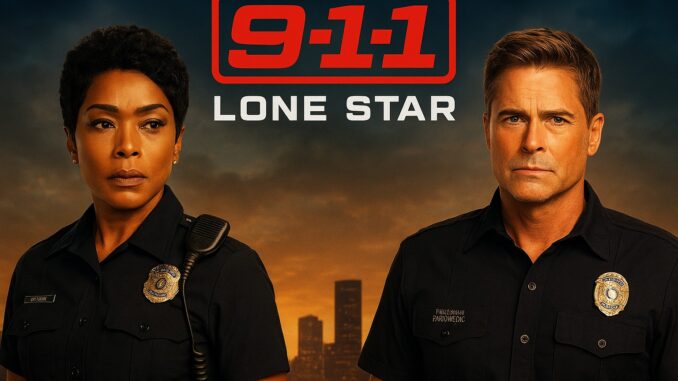
When 9-1-1 first started airing back in 2018, episodes were on the FOX network. Two years later, creator Ryan Murphy decided to capitalize on its success with another entry in the 9-1-1 world. 9-1-1: Lone Star, starring Rob Lowe and Gina Torres, also aired on FOX, and has a similar set-up to the original 9-1-1. It follows a specific group of first responders, but is located in Texas instead of California. The firefighters, 9-1-1 operators, and police officers are put through tons of terrifying natural disasters and all kinds of odd, yet fascinating emergencies (and most of them are faced with life-threatening injuries at least once). Both shows have similar vibes of high-octane rescues and adrenaline-pumping situations mixed with humor and found-family themes.
The two shows managed to throw in a few crossover episodes, where the worlds of the original show mixed with the new series. An episode in 2021 shows 9-1-1 responders showing up to fight a dangerous wildfire in Texas. Plus, in Season 3, Athena Grant (Angela Bassett) assists Carlos Reyes (Rafael L. Silva) and Grace Ryder (Sierra McClain) on a case they were investigating. These crossovers were a fun way to see how the two shows were linked within the 9-1-1 universe.
But then, in Season 7, 9-1-1 switched networks to ABC, making future crossovers pretty unlikely. Not only were the series airing on different nights, but on different networks as well. This created an impossible divide within the franchise, which was most likely one of the factors that led to 9-1-1: Lone Star’s cancellation in Season 5. Although the team in Texas is no more, a new entry in the franchise might spell hope that future crossovers could be a reality.
When two shows share the same franchise, fans usually expect them to stick together. But in the case of 9-1-1 and its spinoff 9-1-1: Lone Star, things took a dramatic turn. The original 9-1-1 shifted networks, while Lone Star stayed behind, and suddenly the two weren’t airing side by side anymore. This change left many viewers scratching their heads. Let’s break down what happened, why it happened, and what it means for the future of both shows.
The Origins of the 9-1-1 Franchise
How It All Began
Back in 2018, 9-1-1 premiered on Fox and instantly pulled in millions of viewers with its mix of high-stakes rescues, emotional storylines, and unforgettable characters. It wasn’t just a hit—it became one of Fox’s most reliable scripted dramas.
The Birth of Lone Star
After the success of 9-1-1, it was only natural for Fox to expand the universe. In 2020, 9-1-1: Lone Star premiered, bringing Rob Lowe into the fold as Owen Strand and setting the action in Austin, Texas. Fans got double the drama, double the emergencies, and double the adrenaline.
Why the Network Split Happened
Disney’s Big Move
Here’s where things get complicated. Disney owns ABC but also acquired 20th Television, which produces 9-1-1. Eventually, Disney decided to move 9-1-1 from Fox to ABC to keep it “in the family.”
Lone Star Stays Put
While the flagship show moved, Fox still had broadcast rights to Lone Star. So instead of following 9-1-1 over to ABC, it stayed right where it was. That meant the once-united franchise got split across two networks.
Different Nights, Different Homes
From Monday Nights to Separate Slots
For years, fans loved Monday nights because they got back-to-back drama: 9-1-1 followed by Lone Star. But once the split happened, that ritual disappeared.
-
9-1-1 now airs on ABC.
-
Lone Star continues to air on Fox.
It was like a family dinner suddenly being held at two different houses.
Impact on Fans
Confusion and Frustration
Viewers who tuned in expecting the usual lineup were met with confusion. Many had to adjust their schedules or hunt down the new air dates.
The Fandom Effect
The change also fractured the community vibe. Live-tweeting and fan discussions used to flow seamlessly between the two shows. Now, the excitement feels divided.
Did Ratings Take a Hit?
9-1-1’s Strong Performance
On ABC, 9-1-1 continued to thrive. The move didn’t scare away loyal fans, and the network gave it plenty of promotion.
Lone Star’s Uphill Battle
Lone Star, however, faced a tougher road. Without 9-1-1 as a lead-in, some casual viewers drifted away. The spinoff had to stand on its own legs—and that hasn’t always been easy.
Industry Politics Behind the Scenes
Money Talks
At the end of the day, network decisions usually come down to business. Fox didn’t want to keep paying top dollar for 9-1-1, but it held on to Lone Star as a less expensive option.
Streaming Adds Another Layer
On top of that, streaming rights further complicated the picture. With Hulu (owned by Disney) streaming episodes, the ABC move made even more sense for 9-1-1.
How the Split Changed the Storytelling
Crossover Limitations
One of the biggest fan disappointments? Crossovers. Before the split, crossovers between 9-1-1 and Lone Star created some of the franchise’s most exciting episodes. But with the shows now on separate networks, crossovers are nearly impossible.
Separate Identities
On the flip side, Lone Star has had more room to carve out its own unique identity without constantly being tied to its parent show.
Reactions from the Cast and Crew
Rob Lowe’s Take
Rob Lowe has hinted in interviews that while he loves the franchise, he’s focused on making Lone Star strong enough to stand alone.
Producers’ Perspective
Producers have been diplomatic, emphasizing that the split was about network logistics, not creative differences.
What the Future Looks Like
Will Lone Star Survive Long-Term?
The big question: Can Lone Star thrive without 9-1-1 by its side? With uncertain ratings and the ever-changing TV landscape, nothing is guaranteed.
Could ABC Eventually Pick It Up?
Some fans speculate that Lone Star could eventually follow 9-1-1 to ABC. But for now, there’s no official word.
Comparing Other TV Franchise Splits
It’s Happened Before
This isn’t the first time a TV franchise has been split across networks. Think about Law & Order shows bouncing between NBC and Peacock, or Chicago Fire spawning spin-offs with different fates.
Lessons Learned
The takeaway? Network deals may change, but passionate fan bases often follow their favorite characters anywhere.

How Fans Can Keep Up
Streaming Is Your Friend
Don’t want to miss an episode? Streaming platforms make it easier to keep track of both shows, even if they air on different nights.
Social Media Groups
Fan groups on Twitter, Facebook, and Reddit have stepped in to help viewers stay updated on schedules and cross-show chatter.
The Bottom Line
The split between 9-1-1 and Lone Star wasn’t about creative differences—it was about business, ownership, and network strategy. While it’s sad for fans who loved their Monday-night tradition, both shows are still alive and kicking. And as long as emergencies keep happening on-screen, audiences will keep tuning in.
Conclusion
The move that separated 9-1-1 and 9-1-1: Lone Star might have felt like a TV earthquake, but it was really just the industry doing what it always does—shuffling shows for strategic reasons. Even though fans lost the back-to-back drama nights, they gained proof that both series can stand strong on their own. Whether they’ll ever reunite on the same night or network remains a mystery, but one thing’s certain: the sirens are still wailing, and the stories are far from over.